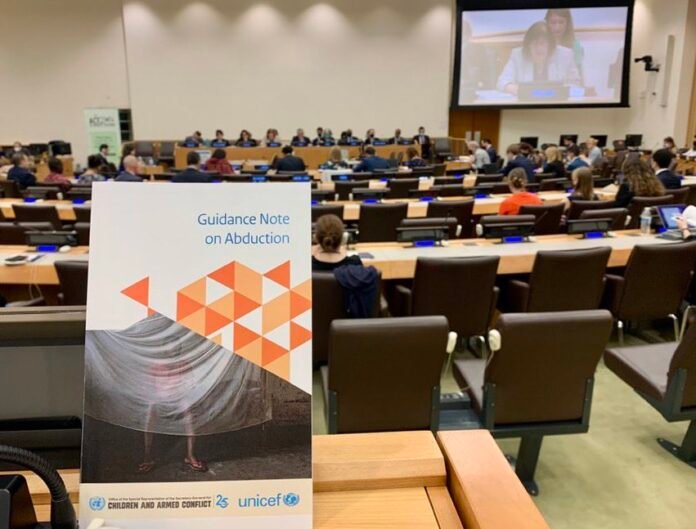NEW YORK, JULY 18 – Addressing an open debate of the Security Council on Children and armed conflicts, the Italian Permanent Representative to the UN, Maurizio Massari, recalled this year’s Secretary-General’s report, according to which, all around the world, children continue to be disproportionately affected by armed conflicts, suffering violations of international humanitarian law and human rights law. The UNSC meeting was co-organized by Italy, Brazil, Canada, Kenya, Malaysia, and Qatar.
“As observed over the last years, abduction is often a triggering cause of other grave violations, namely recruitment and use of sexual violence”, said Massari: “Children continue to be disproportionately affected”. The Ambassador announced that the Office of the Special Representative of the Secretary-General for Children and Armed Conflict and UNICEF drafted this year, with the support of Italy, a “Guidance Note on Abduction”, aimed at strengthening the implementation of resolution 2225 (2015) including monitoring and reporting and advocacy and dialogue with parties to conflict, which was presented later by the Special Representative Virginia Gamba.
 Meeting Special Representative Gamba, Massari praised her unwavering and incessant work for children in conflict and stressed how she can count on Italy’s‘s strong support.
Meeting Special Representative Gamba, Massari praised her unwavering and incessant work for children in conflict and stressed how she can count on Italy’s‘s strong support.
The Guidance Note offers additional tools to practitioners to address this complex grave violation of children’s rights in times of war. With the six grave violations against children in armed conflict being intrinsically interlinked, children often endure other grave violations during the time of their abduction and are recruited and used, killed, maimed, or sexually abused.
In recent years, the abduction of children has risen steeply in situations on the children and armed conflict agenda, whether to terrorize communities, target specific groups, or to force the participation of children in hostilities. In response to this worrying trend, the UN Security Council adopted resolution 2225 in 2015 and formally recognized the importance of holding parties accountable for abducting children.
The guidance note was produced by the Office of the Special Representative of the Secretary-General for Children and Armed Conflict in consultation with UNICEF, the Department of Political and Peacebuilding Affairs, and the Department of Peace Operations in the framework of the Monitoring and Reporting Mechanism (MRM) Technical Reference Group. “With a 90% increase of verified incidents of abduction in 2020 and a sustained increase in 2021 at 20%, there is an urgent need to ensure that all those working on monitoring, reporting, and advocating are equipped with strong tools to end and prevent the abduction of children, in line with the Security Council request. This guidance note on abduction aims at responding to this urgently pressing need,” the Special Representative of the Secretary-General for Children and Armed Conflict, Virginia Gamba said.
Countries and regions presenting the highest numbers of children abducted in 2020 and 2021 were Somalia, the Democratic Republic of the Congo, Syria, Burkina Faso, and the Lake Chad basin region, mostly affecting boys but with girls being increasingly targeted at an alarming rate.
The abduction of children to serve armed conflict, in contravention of applicable international law, has dramatic consequences on the physical and mental wellbeing of children, their families, and communities, with possible impacts on the long-term peace and security contexts. Post-conflict considerations are also touched on in the guidance note, such as the suggestion to include elements for the protection of children aiming at ending and preventing their abduction in peace processes and resulting peace agreements, as well as providing long-term and tailored reintegration programmes for released children.
In addition to providing specific and practical guidance to child protection staff on the ground, the guidance note on abduction also includes examples from the field which can help inform the understanding of the grave violation, as well advocacy tools that can be used as part of efforts to end and prevent the abduction of children by parties to conflict.
“Even when released or if they managed to escape their captors, abducted children continue to face major challenges regarding their reintegration back into their communities. Their needs must be addressed in a comprehensive and sustainable way, and we encourage the international community to continue to provide support to all those working on the children and armed conflict agenda on the ground who are doing outstanding work for conflict-affected children. Their work is ensuring that wherever they are, all children surviving grave violations also have a chance to a new life, in which they can thrive,” Virginia Gamba added.
* The Guidance Note is formally released today in an event co-organized by the Permanent Mission of Italy to the United Nations and co-sponsored by the governments of Brazil, Canada, Kenya, Malaysia, and Qatar.
(@OnuItalia)

